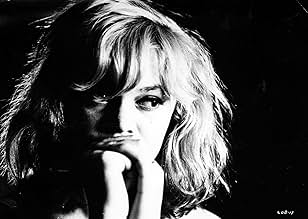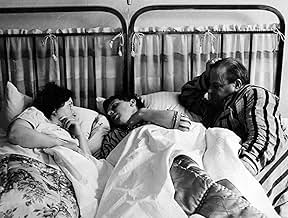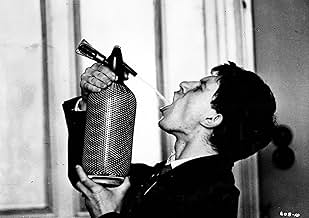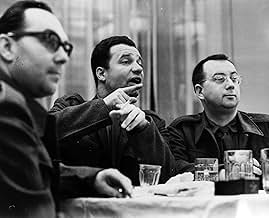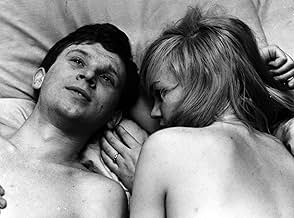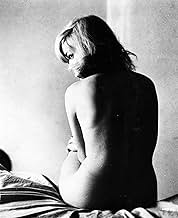NOTE IMDb
7,4/10
10 k
MA NOTE
Une jeune femme de la classe ouvrière dans une petite ville tchèque pass la nuit avec l'un des membres d'un groupe de Prague. N'entendant plus parler de lui, elle fait ses bagages et arrive ... Tout lireUne jeune femme de la classe ouvrière dans une petite ville tchèque pass la nuit avec l'un des membres d'un groupe de Prague. N'entendant plus parler de lui, elle fait ses bagages et arrive à sa porte, mettant sa famille dans le pétrin.Une jeune femme de la classe ouvrière dans une petite ville tchèque pass la nuit avec l'un des membres d'un groupe de Prague. N'entendant plus parler de lui, elle fait ses bagages et arrive à sa porte, mettant sa famille dans le pétrin.
- Réalisation
- Scénario
- Casting principal
- Nommé pour 1 Oscar
- 2 victoires et 4 nominations au total
Jana Novaková
- Jana
- (as Jana Nováková)
Jindrich Heidelberg
- Reditel
- (non crédité)
Dana Valtová
- Bohunka
- (non crédité)
Avis à la une
This is the second of Forman's Czech films I've watched after the other Criterion release, THE FIREMAN'S BALL (1967) - though that was via a late-night Italian TV broadcast some years ago; these two films constitute his most celebrated work from this early phase in his career.
While a pleasant and sharply-observed comedy-drama in itself, which must have seemed fresh at the time (particularly the intimate detail of its teenage romance), I feel that a lot of these unassuming but critically-acclaimed foreign films - often made under strained political conditions - tend to come off as overrated when viewed today (a similar recent example I encountered was CLOSELY WATCHED TRAINS [1966]). That said, the film benefits immensely from the wonderful cinematography by Miroslav Ondricek (Forman's longtime collaborator).
Besides, it also includes a couple of lengthy - and delightful - set-pieces: the party sequence, in which the heroine and her two best friends are picked up by a trio of geeky middle-aged soldiers; the scene at the home of the girl's 'boyfriend' (with whom she had a one-night stand), where she causes a commotion by turning up unannounced on his doorstep with a packed suitcase!
The DVD supplements comprise an amusing but irrelevant deleted scene, and an interesting 17-minute interview with Forman - in which he discusses the film's genesis and how the mix of professional and untrained actors proved providential, sealing its essential charm.
While a pleasant and sharply-observed comedy-drama in itself, which must have seemed fresh at the time (particularly the intimate detail of its teenage romance), I feel that a lot of these unassuming but critically-acclaimed foreign films - often made under strained political conditions - tend to come off as overrated when viewed today (a similar recent example I encountered was CLOSELY WATCHED TRAINS [1966]). That said, the film benefits immensely from the wonderful cinematography by Miroslav Ondricek (Forman's longtime collaborator).
Besides, it also includes a couple of lengthy - and delightful - set-pieces: the party sequence, in which the heroine and her two best friends are picked up by a trio of geeky middle-aged soldiers; the scene at the home of the girl's 'boyfriend' (with whom she had a one-night stand), where she causes a commotion by turning up unannounced on his doorstep with a packed suitcase!
The DVD supplements comprise an amusing but irrelevant deleted scene, and an interesting 17-minute interview with Forman - in which he discusses the film's genesis and how the mix of professional and untrained actors proved providential, sealing its essential charm.
10jtur88
I don't think I've ever seen a movie that so faithfully captured the sense of place. I spent many months in the mid-60's in Czechoslovakia and Eastern Europe, and when I recently saw this film, it brought tears of nostalgia to my eyes. The scene in the parents' house, when the family was faced with the arrival of the unexpected stranger, is documentary in its portrayal of how a household would look in those times, complete to the smallest details of housekeeping and behavior. It is light-hearted without being slapstick, and it is poignant without being corny. Every character is right on the mark. On my very very short list of the greatest movies ever. In short, it is perfect. See this film, and take the whole family.
"Loves of A Blonde" is a catchy, racy title for what is actually a gentle,low-key and affectionate look at a love affair in communist Czechoslovakia in the mid-60's. The film concerns a young (yes, blonde)girl who seems to be the prettiest one working in what looks like an extremely bleak factory setting in northern Czechoslovakia. The female workers in this shoe factory seem to far outnumber the males of the town. A band travels through town to play at a weekend dance, and the titled blonde (maybe its just me, but I think she resembles Reese Witherspoon a lot at various times)takes up with the piano player. Complications ensue.
There are a number of sweetly comic moments in the film, and it has a great deal of affection for its various characters. Its not all laughs, though, as there is a melancholy undertow to all that goes on. The portrait of Czech society seems decidedly bleak...ugly towns, dreary jobs, precious little fun. The ending is rather ambiguous, but I felt it to be definitely more downbeat than upbeat. You smile, but I felt sad afterward - a feeling rather common after a youthful love affair, I suppose.
There are a number of sweetly comic moments in the film, and it has a great deal of affection for its various characters. Its not all laughs, though, as there is a melancholy undertow to all that goes on. The portrait of Czech society seems decidedly bleak...ugly towns, dreary jobs, precious little fun. The ending is rather ambiguous, but I felt it to be definitely more downbeat than upbeat. You smile, but I felt sad afterward - a feeling rather common after a youthful love affair, I suppose.
A factory manager in rural Czechoslovakia bargains with the army to send men to the area, to boost the morale of his young female workers, deprived of male company since the local boys have been conscripted.
Loves of a Blonde has often been identified as one of the most significant and ambitious productions of the Czech New Wave, a movement in which a group of young filmmakers, many of whom were educated by the national film academy in Prague, including Forman, Ján Kadár, Věra Chytilová and Jiří Menzel, among others, took significant political risks by using cinema to protest the hypocrisy and absurdity of the Communist state.
I'll say it before and I'll say it again, of all the "new wave" movements in Europe, by far my favorite is the one that came out of the Czech cinema. The beauty, the honesty and sometimes the surrealism (though not here) is just spot on, and for me really captures what it means to have film as an art form. That Forman went on to become an international success is no surprise.
Loves of a Blonde has often been identified as one of the most significant and ambitious productions of the Czech New Wave, a movement in which a group of young filmmakers, many of whom were educated by the national film academy in Prague, including Forman, Ján Kadár, Věra Chytilová and Jiří Menzel, among others, took significant political risks by using cinema to protest the hypocrisy and absurdity of the Communist state.
I'll say it before and I'll say it again, of all the "new wave" movements in Europe, by far my favorite is the one that came out of the Czech cinema. The beauty, the honesty and sometimes the surrealism (though not here) is just spot on, and for me really captures what it means to have film as an art form. That Forman went on to become an international success is no surprise.
It is true but sad that no one in the world would have known about a small Czech town named Zruc if Czech director Milos Forman had not made this film.It is a good thing that he has made it as its fresh appeal would ensure that it is remembered as a supreme example of a famous cinema movement of the sixties called Czech new wave."Lásky jedné Plavovlásky" is a touching film about sad realities, disappointments in love faced by innocent people when they pursue an idle romantic relationship.It is based on a real event which took place in Milos Forman's life when at Prague he saw a beautiful albeit a lost girl roaming in the middle of the night.We see the lives of young people especially young girls who feel bored as there is hardly any male companionship available to them.As this film was made in socialist times we also get to see the attitude of parents belonging to a socialist system.Milos Forman makes his film memorable when he deals with risks which young people take when they fall in live.He conveys that it is not so easy to continue a relationship which has remained frivolous from its inception.Loves of a blonde maintains it serious stance as there is a talk of a serious problem of dwindling male female ratio faced by many European nations.One of the most funny moments of this film include a good social experiment when an army unit is asked to move to Zruc in order to woo its lonely girls.
Le saviez-vous
- AnecdotesDirector/screenwriter Milos Forman got the idea for the movie when he met a young girl with a suitcase in the streets of Prague. Her story was very similar to the one in the film.
- ConnexionsFeatured in Fejezetek a film történetéböl: A cseh új hullám (1990)
Meilleurs choix
Connectez-vous pour évaluer et suivre la liste de favoris afin de recevoir des recommandations personnalisées
- How long is Loves of a Blonde?Alimenté par Alexa
Détails
- Date de sortie
- Pays d’origine
- Langue
- Aussi connu sous le nom de
- Loves of a Blonde
- Lieux de tournage
- Zruc nad Sázavou, République tchèque(formerly Czechoslovakia)
- Sociétés de production
- Voir plus de crédits d'entreprise sur IMDbPro
- Durée1 heure 28 minutes
- Couleur
- Mixage
- Rapport de forme
- 1.37 : 1
Contribuer à cette page
Suggérer une modification ou ajouter du contenu manquant

